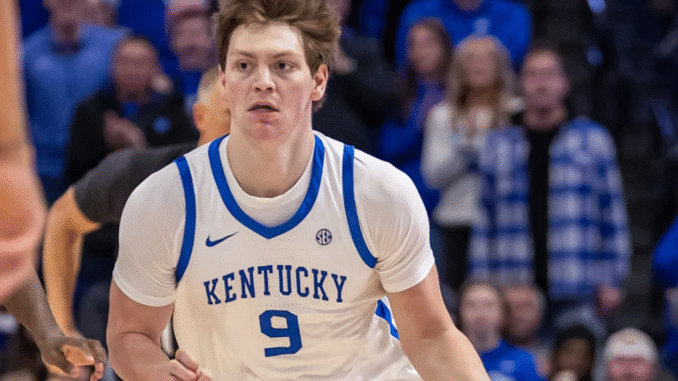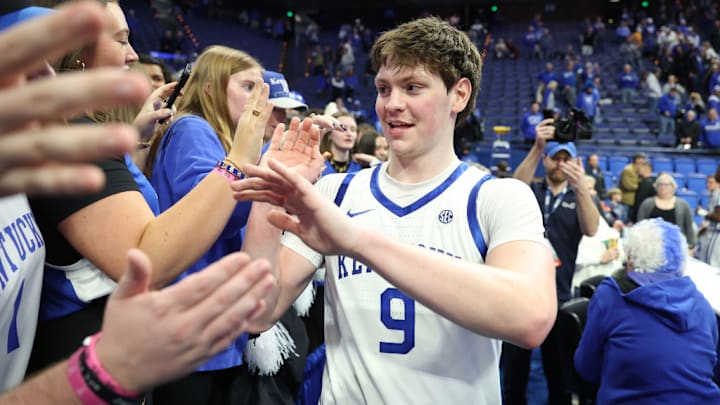
Stitched across Trent Noah’s jersey is a single number—bold, blue, and quietly significant: 9. Just one digit, easy to miss unless you understand the weight it carries.
Noah, a proud native of Kentucky’s Appalachian heartland, didn’t always seem bound for the Wildcats. The four-star forward from Harlan County had pledged his commitment to South Carolina and coach Lamont Paris. But in Kentucky, spring has a way of rewriting futures. John Calipari departed for Arkansas. Mark Pope returned home. And when Pope reached out, Noah listened. This time, it wasn’t about sales pitches or scholarship charts—it was about a sense of belonging.
When Noah first pulled on the Kentucky blue, Rupp Arena responded—not with the roar reserved for five-star hype or hometown legends, but with something quieter, deeper. For Eastern Kentucky, it was recognition. Noah wasn’t just wearing a jersey; he was carrying a region. For many, that number 9 stitched on his chest stood for more than just a player. It stood for pride, identity, and the power of being seen.

But the jersey held more than just a number.
It had been over 80 years since anyone wore No. 9 for Kentucky basketball. The last to do so was a quiet, disciplined young man from Campbellsburg, Kentucky—Kenneth England.
England played three seasons under the legendary Adolph Rupp in the early 1940s. A selfless, team-first player, his best season came in 1941–42, when he scored 117 points over 24 games. But before he could finish his time in Lexington, the world called on him for something far greater.
Like so many of his generation, England traded hardwood for battlefield. He joined the U.S. Army and became a captain in the 10th Mountain Division—the only American ski troop. By December 1944, he was leading men through the icy mountains of Italy. He helped liberate Mt. Belvedere from Nazi control, earning a Bronze Star for his courage and leadership.
Then came April 14, 1945.
Captain England was fatally wounded while leading his men across a minefield in northern Italy. Even in his final moments, he insisted his morphine be given to others. For his valor, he was posthumously awarded the Silver Star.
A field in Italy now bears his name. A single gold star shines on the wall of Memorial Coliseum in Lexington. But for decades, his jersey number—No. 9—remained sacred. Untouched.
Until now.
When Kentucky unveiled the newly renovated Memorial Coliseum this past April—a space honoring more than 10,000 Kentuckians who served in the military—one gold star stood quietly among the rest. It bore the name Kenneth England. No fanfare. Just memory. And meaning.
“This is the first year since 1943 that anyone has worn his number,” said Margina Grow, a relative of England, in an interview with LEX18. “So we’ve been cheering for Trent Noah.”
They don’t cheer because Noah is a future star or a highlight reel in the making. They cheer because a boy from Harlan County now carries the story of a soldier from Campbellsburg. They cheer because, in Kentucky’s most sacred spaces, the past is never forgotten.
When Trent Noah steps onto the court next season, there will be stats and scores, wins and losses, shots made and missed. There will be hustle plays and big moments that bring Rupp Arena to life.
But there will also be something else—something deeper.
Every time he plays, Noah carries more than expectation.
He carries legacy.
He carries memory.
He carries a jersey that went unworn for more than eight decades.
And stitched across his chest is one number—just a single digit—that now tells two stories:
One of a Kentucky kid chasing a dream.
And another of a Kentucky hero who gave everything for something greater.

Leave a Reply